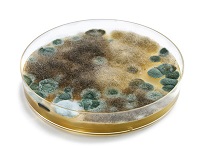Rancidity Control of Metalworking Fluids
 Rancidity – the chemical decomposition of fats, oils and other lipids – happens when bacteria, yeasts and mold are allowed to multiply in metalworking fluids. The result is a foul odor, poor tool life, oxidation on the work piece surface and ultimately unhappy workers. Certain types of rancidity can also cause metalworking fluids to darken and stain parts, and neutralize the rust-inhibiting characteristics of the fluid. Left unchecked, endotoxins, an illness-causing compound found in bacteria and other pathogens can make things even worse. While it is not feasible or even desirable, to eliminate all microorganisms from a metalworking fluid system, it is possible to limit their growth and prevent rancidity by a few simple control practices.
Rancidity – the chemical decomposition of fats, oils and other lipids – happens when bacteria, yeasts and mold are allowed to multiply in metalworking fluids. The result is a foul odor, poor tool life, oxidation on the work piece surface and ultimately unhappy workers. Certain types of rancidity can also cause metalworking fluids to darken and stain parts, and neutralize the rust-inhibiting characteristics of the fluid. Left unchecked, endotoxins, an illness-causing compound found in bacteria and other pathogens can make things even worse. While it is not feasible or even desirable, to eliminate all microorganisms from a metalworking fluid system, it is possible to limit their growth and prevent rancidity by a few simple control practices.
Cimcool technical report helps us understand the detailed causes and possible remedies.


